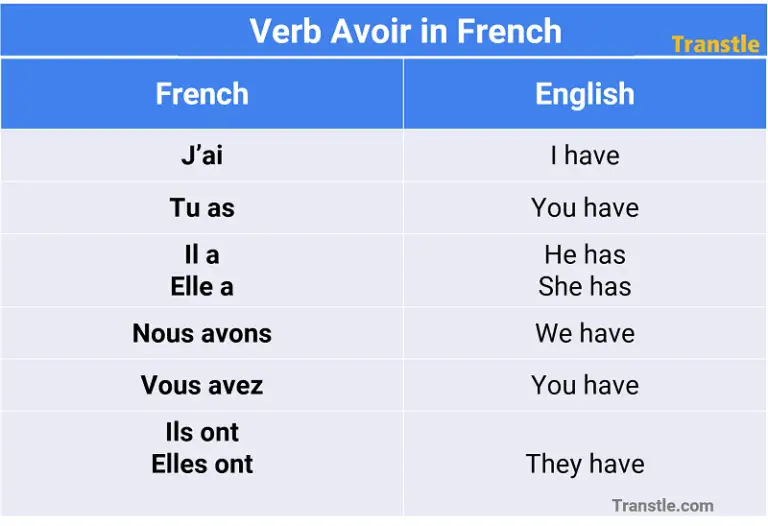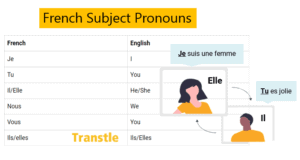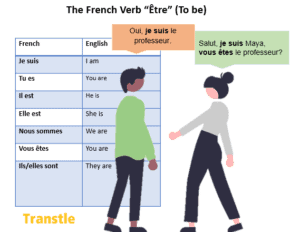Avoir: How To Use it, Conjugation And Examples
The verb avoir
The verb “avoir” is a French verb that means “to have” and it’s used to express ownership or possession, for example, “They have a pool” or “I have a car”. It can also be used to express states or feelings, such as “I’m scared” or “You are hungry”.
Additionally, “avoir” is used to form compound verb tenses, such as the passé composé (I have arrived), the past perfect (we had arrived), and the future perfect (they will have arrived). Understanding the different uses of “avoir” is essential for learning and communicating effectively in French. It is the second most used verb in French after the verb “être”.
Conjugation of avoir in the present tense

| French | English |
| J’ai (Je ai) | I have |
| Tu as | You have |
| Il / Elle a | He / She / It has |
| Nous avons | We have |
| Ils / Elles ont | They have |
Examples or sentences of avoir
|
How to use avoir
Avoir has two uses, one as a main verb where it expresses ownership and feelings and another as an auxiliary verb to express actions or events.
Property or possesion
Subject + verb avoir + what is owned or possessed
|
Feelings or states
Subject + avoir + complement (the feeling)
|
Avoir as an auxiliary verb
As an auxiliary verb, “avoir” is used to form compound tenses in French, as in the passé compossé. An auxiliary verb is a verb that accompanies and complements another main verb. In the sentence “I have seen it”, the main verb is “seen” and the auxiliary verb is “have”.
Subject + Auxiliary Verb (Avoir) + Main Verb + Complement
|
In the previous sentences, avoir is the auxiliary and “to eat” and “to cut” are the main ones. Let’s now see the conjugation of the verb avoir as an auxiliary to the verb “acheter” (buy).
| Subject | Present perfect | English |
| Je | ai acheté | I have bought |
| Tu | as acheté | You have bought |
| Il / Elle | a acheté | He / She / It has bought |
| Nous | avons acheté | We have bought |
| Ils / Elles | ont acheté | They have bought |
A detailed explanation of the “passé composé” tense is beyond the scope of this lesson, and it is briefly mentioned here to illustrate the use of “avoir”.
Avoir in l’imparfait
In French, “l’imparfait” is commonly used in everyday conversations to express an action or fact that happened in the past and may still be relevant to the present moment. This tense is also used in other romance languages. For example, “Elena played” could be expressed in “l’imparfait” tense in French as “Elena jouait”.
| French | English |
| J’ avais (Je avais) | I had |
| Tu avais | You had |
| Il / elle / avait | He/ She had |
| Nous avions | We had |
| Vous aviez | You had |
| Ils / elles avaient | They had |
Examples
|
Contraction
A contraction is a shorter way of writing two words by removing one or more letters. In French, contractions are often made with the first-person singular pronoun “Je” (meaning “I”).
For example, instead of writing “Je ai un travail” (which means “I have a job”), you can use the contraction “J’ai un travail”. This contraction is formed by removing the letter “e” from “Je” and replacing it with an apostrophe.
Exercises
Now practice the verb avoir with the following test or exercises.

Time's up
Read next



